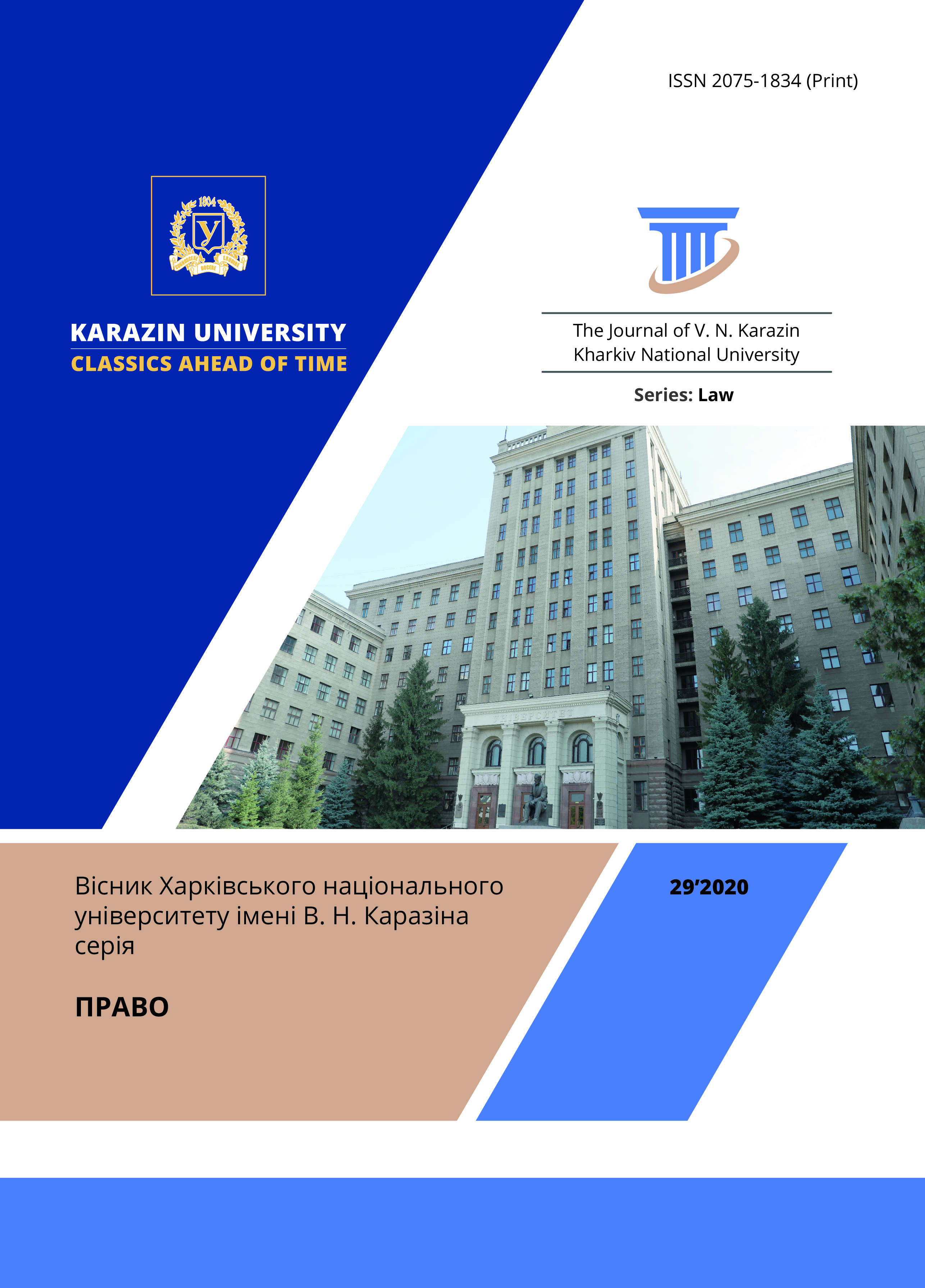INTERNATIONAL EXPERIENCE OF THE PROSECUTOR'S OFFICE ORGANIZATION
Abstract
ANNOTATION. Problematic aspects of defining the tasks and place of the prosecutor's office, as well as the foreign strategy of improving the organization of the prosecutor's office are highlighted. The experience of foreign countries of the developed democracy, concerning the work of the prosecutor's office for its implementation in the legislation of Ukraine, the history of its origin and its modern purpose are analyzed. On the basis of a comparative study of foreign prosecutor's offices data on their place in the system of government, type of model and basic functions are given, which gives an idea of the role and directions of development of the prosecutor's office in the leading countries of the modern world. It is stated that the modern Prosecutor's Office of France is referred to the executive branch of power and reports to the Ministry of Justice. Prosecutors are very close to the judge's corps because they receive the same training and often move from prosecutors to judges and vice versa throughout their careers. In Germany, prosecuting authorities operate at the general courts of all levels. The Attorney General of the Federal Republic of Germany exercises his authority under the general authority of the Minister of Justice of Germany. According to a special law that defines the legal status of the Prosecutor's Office in Latvia, the prosecutor's office is a judicial authority that independently supervises compliance with the law within the established competence. In the UK, there is no public prosecutor's office or its direct analogue. The Public Prosecutor's Office operates within the system of public authorities as an independent authority, coordinated by the General Atorney. In the Republic of Lithuania, prosecutors organize and manage the pre-trial investigation process, as well as support state prosecutions in criminal cases. The author summarizes that there is no uniform standard in Europe for the prosecutor's model. The prosecutor's models analyzed have advantages and disadvantages, but none of them excludes or prefers one or the other model. Recommendations on improving the Prosecutor's Office of Ukraine have been provided.
KEY WORDS: prosecutor's office, organization of the prosecutor's office, international experience, model of the prosecutor's office, place of the prosecutor's office, prosecutor, powers of the prosecutor.
Downloads
References
2. Ліпінська І.В. Функціонування органів прокуратури: Україна та міжнародний досвід. Вчені записки Таврійського національного університету імені В. І. Вернадського. Серія : Юридичні науки. 2018. Т. 29 (68), № 6. С. 143-147. URL: http://nbuv.gov.ua/UJRN/ (дата звернення 31.12.2019)
3. Конституція України : Закон України від 28.06.1996 № 254к/96-ВР // База даних «Законодавство України»/ ВР України. URL: https://zakon.rada.gov.ua/rada/show/254%D0%BA/96-%D0%B2%D1%80 (дата звернення 31.12.2019)
4. Нірода М.В. Генезис органів прокуратури в країнах романо-германської правової сім’ї: короткий історичний екскурс. Науковий вісник Ужгородського національного університету. 2015. Серія ПРАВО. Випуск 33. Том 1. С. 93-96.
5. Чаплинська Ю. Досвід Франції та Німеччини в реформуванні органів прокуратури та можливості його використання в Україні. Visegrad Journal on Human Rights. 2016. № 6/3. С. 136-140.
6. Сухонос В.В. Конституційно-правові засади організації і діяльності прокуратури в Україні та зарубіжних країнах: порівняльний аналіз. Часопис Київського університету права. 2011. № 1. С. 75-80. URL: http://nbuv.gov.ua/UJRN/Chkup_2011_1_21 (дата звернення 31.12.2019)
7. Тюренкова К.А., Демидов А.С. Конституционно-правовой статус прокуратуры в зарубежных странах: сравнительно-правовой анализ. [Constitutional and legal status of prosecutors in foreign countries: comparative legal analysis]. (2015). moluch.ru. Retrieved from: https://moluch.ru/archive/101/22885/ [in Russian].
8. Рибалка Н.О. Зарубіжний досвід управління органами прокуратури та можливості його використання в Україні. Південноукраїнський правничий часопис. 2013. № 1. С. 15-19.
9. Миколенко В. А. Модернізація конституційно-правового статусу прокуратури в європейських країнах: порівняльно-правовий аналіз. Актуальні проблеми політики. 2016. Вип. 58. С. 276-285.
10. Супруненко Д.О. Історико-правові засади реалізації функцій прокуратури як суб’єкта запобігання злочинам: досвід зарубіжних країн. Вісник кримінологічної асоціації України. 2016. № 1 (12). С. 246-256.
11. Прокуратура: статус, структура, функції та організація діяльності. Матеріали міжнародного науково-практичного семінару «Запровадження антикорупційної спеціалізації прокурорів: європейський досвід і перспективи в Україні». 2008. URL: https://www.oecd.org/corruption/acn/lawenforcement/41651559.pdf (дата звернення 31.12.2019)
12. The Code of Conduct of the Prosecutors of Lithuania. (2004). www.legislationline.org. Retrieved from https://www.legislationline.org/download/id/7471/file/Lithuania_code_of_conduct_of_prosecutors_2004_en.pdf
13. Толочко О. М. Європейські стандарти організації та функціонування прокуратури в демократичному суспільстві. Прокуратура України в умовах європейської інтеграції: матеріали Міжнародної науково-практичної конференції (19 травня 2016 року). К.: Національна академія прокуратури України. 2016. C. 282-285.
Citations
Prosecutor's Procedural Guidance on Pre-Trial Investigation: International Experience and National Realities
Bibikova Marharyta O. (2022) Naukovij vìsnik Nacìonalʹnoï akademìï vnutrìšnìh sprav
Crossref
Copyright (c) 2020 S. Banakh

This work is licensed under a Creative Commons Attribution 4.0 International License.




